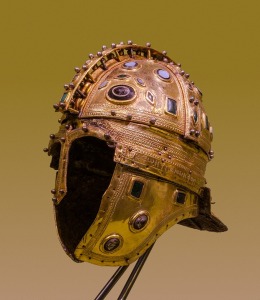
The historian Sextus Julius Frontinus (c. 40-103 A.D.) wrote an interesting book called Stratagems (Strategamaton) which provides historical examples of various military ruses. It is actually a vast digest of historical examples that was meant to serve as a commander’s handbook of military advice. One of the chapters I was reading recently I wanted to share with readers here. It is called “How An Army Should Be Aroused To Battle (Quemadmodum incitandus sit ad proelium exercitus).
Frontinus gives us a series of examples on this topic. He teaches by way of illustration, not by explanation. The reader is expected to draw his own conclusions on the wider principles involved. Here are his examples (taken from I.11 et seq.) of how armies and men can be inspired to do battle.
1. Fulvius Nobilior was fighting against the Samnites with a small force. He was losing. So he pretended that one legion of his enemy had been bribed by him to turn traitor, even though this was not true. Fulvius had his men set aside a large sum of money in furtherance of this assertion. He promised his men that when victory had been achieved, he would amply reward those who had contributed gold and silver for the alleged “payoff.” Fired by this promise, the Romans attacked with ferocity and won a great victory. Sometimes it is necessary to deceive even your own men.
2. Caesar was fighting against the Germans and their king, Ariovistus. He called his men together and told them that he was especially selecting one of his units–the Tenth Legion–to attack the enemy alone. He praised the unique qualities and heroism of unit to his other units. By doing this, he inspired in the other units a healthy feeling of competition and envy. In this way, he raised the fighting morale of all his units.
3. Agesilaus, a Spartan general, had pitched his camp near the city of Orchomenos. He learned that many of his soldiers were storing their possessions within the safety of the town. So he told the townspeople not to accept any of his soldiers’ belongings. He reasoned that his men would fight better knowing that they were fighting for their worldly goods, and that there was no safe place for such things except through combat.
4. Epaminondas once lied to his men about the intentions of the Spartans. He told his men–falsely–that if they were to lose to the Spartans, that the Spartans would slay all males and destroy the city of Thebes. Inspired by courage born of desperation, the Thebans attacked the Spartans with ferocity and overwhelmed them.

5. Pericles, on one occasion before battle, had one of his troops actually dress up as a “god” and appear partially obscured in a grove of trees and announce that the Athenians had been divinely selected for victory. When his men heard things, they were filled with ardor.
6. The commander Quintus Sertorius was once using barbarian troops who were known to be superstitious. So he brought around his camp a perfectly white deer, and took it around with him. He used this animal as a talisman and a good-luck charm, and claimed that it had come to him by way of the gods. His men were inspired by this spectacle. (This incident is mentioned in Aulus Gellius, XV.22).
7. Alexander the Great was known to manipulate the entrails of animals so that it appeared that the livers of the sacrificial victims were imprinted with his initials. By using such hocus-pocus, he would convince his men that the gods were on their side.
8. Gelo, the tyrant of Syracuse, knew his men were fearful of their enemies the Carthaginians. To dispel this feeling, he had some captured Carthaginians stripped naked and paraded, so that his men could see that they were fragile mortals like all other men.
9. Cyrus, king of the Persians, liked to keep his men busy and occupied. He ordered them to cut down a forest on one day. On the next day, he gave them a feast. When he asked them which even they liked better, they told him, “the feast.” He responded by saying that a feast has no taste unless it has been won by labor. This was how he motivated them for battle against his foes.
10. Lucius Sulla used the same tactic as Cyrus. He wore out his men with tedious and exhausting tasks, so that eventually they came to prefer battle to having to fulfill his manual labor assignments.
These, then, are some of the ways that ancient commanders inspired their men to enter battle with enthusiasm. The methods use a mix of trickery, shame, and psychological insight into the motivations of men. Here is illustrated a principle: appeals to altruistic goals are often not enough. To get men moving, something more is often needed. This is not an absolute principle; in history, men have often been inspired by religious, ideological, or patriotic motivations. But other incentives certainly do help.
Read More: Invective Has A Distinguished Lineage

You must be logged in to post a comment.